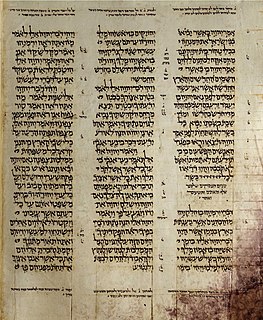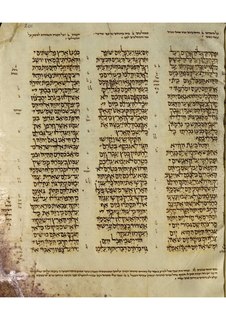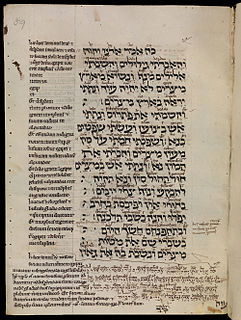Text
The original text was written in Hebrew language. This chapter is divided into 21 verses in Christian Bibles, but 20 verses in the Hebrew Bible with the following verse numbering comparison: [1]
Verse numbering for Isaiah 8 and 9| English | Hebrew |
|---|
| 9:1 | 8:23 |
| 9:2–21 | 9:1–20 |
This article generally follows the common numbering in Christian English Bible versions, with notes to the numbering in Hebrew Bible versions.

Isaiah 53 is the fifty-third chapter of the Book of Isaiah in the Hebrew Bible or the Old Testament of the Christian Bible. This book contains the prophecies attributed to the prophet Isaiah and is one of the Nevi'im. Chapters 40 through 55 are known as "Deutero-Isaiah" and date from the time of the Israelites' exile in Babylon.
The New Testament frequently cites Jewish scripture to support the claim of the Early Christians that Jesus was the promised Jewish Messiah, but few of these citations are actual predictions in their original context. The majority of these quotations and references are taken from the Book of Isaiah, but they range over the entire corpus of Jewish writings.
Pele-joez-el-gibbor-abi-ad-sar-shalom is a prophetic name or title which occurs in Isaiah 9:5 in the Hebrew Bible. It is one of a series of prophetic names found in chapters 7, 8 and 9 of the Book of Isaiah, including most notably Immanuel "God with us", and Maher-shalal-hash-baz - "He has made haste to the plunder!" - in the previous chapter, which is a reference to the impending plunder of Samaria and Damascus by the king of Assyria.

Jeremiah 1 is the first chapter of the Book of Jeremiah in the Hebrew Bible or the Old Testament of the Christian Bible. This book, one of the Nevi'im or Books of the Prophets, contains the prophecies attributed to the prophet Jeremiah. This chapter serves as an introduction to the Book of Jeremiah and relates Jeremiah's calling as a prophet.

Zechariah 12 is the twelfth of the total 14 chapters in the Book of Zechariah in the Hebrew Bible and the Old Testament of the Christian Bible. This book contains the prophecies attributed to the prophet Zechariah, and is a part of the Book of the Twelve Minor Prophets. This chapter is a part of a section consisting of Zechariah 9–14. This chapter and chapter 13 verses 1–6 are a section, forming a three-section "entity" with 13:7–9 and 14:1-21.
Isaiah 49 is the forty-ninth chapter of the Book of Isaiah in the Hebrew Bible or the Old Testament of the Christian Bible. This book contains the prophecies attributed to the prophet Isaiah, and is one of the Books of the Prophets. Chapters 40-55 are known as "Deutero-Isaiah" and date from the time of the Israelites' exile in Babylon. This chapter includes the second of the songs of the "Suffering Servant".
Isaiah 42 is the forty-second chapter of the Book of Isaiah in both the Hebrew Bible and the Old Testament of the Christian Bible. This book contains the prophecies attributed to the prophet Isaiah, and is a part of the Books of the Prophets. Chapters 40-55 are known as "Deutero-Isaiah" and date from the time of the Israelites' exile in Babylon. This chapter contains a poem known as the first of the "Servant songs" about the servant, whom Jewish tradition holds that Isaiah identifies as either the Israelites themselves or Cyrus.
Isaiah 51 is the fifty-first chapter of the Book of Isaiah in the Hebrew Bible or the Old Testament of the Christian Bible. This book contains the prophecies attributed to the prophet Isaiah, and is one of the Books of the Prophets. Chapters 40-55 are known as "Deutero-Isaiah" and date from the time of the Israelites' exile in Babylon. This chapter expresses the consolation of the Lord offered to the people of Israel.
Isaiah 40 is the fortieth chapter of the Book of Isaiah in the Hebrew Bible or the Old Testament of the Christian Bible, and the first chapter of the section known as "Deutero-Isaiah", dating from the time of the Israelites' exile in Babylon. This book contains the prophecies attributed to the prophet Isaiah, and is one of the Books of the Prophets. Parts of this chapter are cited in all four canonical Gospels of the New Testament.
Isaiah 7 is the seventh chapter of the Book of Isaiah in the Hebrew Bible or the Old Testament of the Christian Bible. This book contains the prophecies attributed to the prophet Isaiah and is one of the Books of the Prophets.
Isaiah 3 is the third chapter of the Book of Isaiah in the Hebrew Bible or the Old Testament of the Christian Bible. This book contains the prophecies attributed to the prophet Isaiah, and is one of the Books of the Prophets. This chapter describes how the corrupt leadership brought about the collapse of the social condition of Jerusalem, and contains Isaiah's prophecies that "For the sin of the people, God will take away the wise men, and give them foolish princes".
Isaiah 8 is the eighth chapter of the Book of Isaiah in the Hebrew Bible or the Old Testament of the Christian Bible. This book contains the prophecies attributed to the prophet Isaiah and is one of the Books of the Prophets.
Isaiah 11 is the eleventh chapter of the Book of Isaiah in the Hebrew Bible or the Old Testament of the Christian Bible. This book contains prophesies attributed to the prophet Isaiah. This chapter can be divided into two main parts, verses 1–9 and verses 11–16, with verse 10 as a connecting statement between them. The New International Version entitles the chapter "The Branch from Jesse".
Isaiah 32 is the thirty-second chapter of the Book of Isaiah in the Hebrew Bible or the Old Testament of the Christian Bible. This book contains the prophecies attributed to the prophet Isaiah, and is one of the Book of the Prophets. The Jerusalem Bible groups chapters 28-35 together as a collection of "poems on Israel and Judah". Unlike the previous chapters, this chapter makes no reference to "the overthrow of the Assyrians".
Isaiah 35 is the thirty-fifth chapter of the Book of Isaiah in the Hebrew Bible or the Old Testament of the Christian Bible. This book contains the prophecies attributed to the prophet Isaiah, and is one of the Books of the Prophets. This is the final chapter in a group which the Jerusalem Bible calls a collection of "poems on Israel and Judah". The New King James Version entitles this chapter "The Future Glory of Zion".
Isaiah 56 is the fifty-sixth chapter of the Book of Isaiah in the Hebrew Bible or the Old Testament of the Christian Bible. This book contains the prophecies attributed to the prophet Isaiah, and is one of the Books of the Prophets. Chapter 56 is the first chapter of the final section of the Book of Isaiah, often referred to as Trito-Isaiah.
Isaiah 61 is the sixty-first chapter of the Book of Isaiah in the Hebrew Bible or the Old Testament of the Christian Bible. This book contains the prophecies attributed to the prophet Isaiah, and is one of the Books of the Prophets. Chapters 56-66 are often referred to as Trito-Isaiah. In chapters 60–62, "three magnificent chapters", the prophet "hails the rising sun of Jerusalem’s prosperity". According to Luke 4:17, Jesus, visiting the synagogue at Nazareth, was handed "the book of the prophet Isaiah" and "found the place" where the opening verses of this chapter were written. The New King James Version sub-titles this chapter "The Good News of Salvation".

Zechariah 9 is the ninth of the total 14 chapters in the Book of Zechariah in the Hebrew Bible or the Old Testament of the Christian Bible. This book contains the prophecies attributed to the prophet Zechariah, and is a part of the Book of the Twelve Minor Prophets. This chapter is a part of a section consisting of Zechariah 9–14. It concerns about the advance of an enemy, but God defends Jerusalem and his king will triumphantly enter the city to bring peace among all nations. This chapter also contains a continuation of the subject in the seventh chapter. The part about the king's entry into Jerusalem is quoted in the New Testament, especially in the event of Jesus' triumphal entry into Jerusalem.

Jeremiah 23 is the twenty-third chapter of the Book of Jeremiah in the Hebrew Bible or the Old Testament of the Christian Bible. This book contains prophecies attributed to the prophet Jeremiah, and is one of the Books of the Prophets.

Ezekiel 17 is the seventeenth chapter of the Book of Ezekiel in the Hebrew Bible or the Old Testament of the Christian Bible. This book contains the prophecies attributed to the prophet/priest Ezekiel, and is one of the Books of the Prophets. This chapter tells, and then interprets, the riddle of the great eagle.







